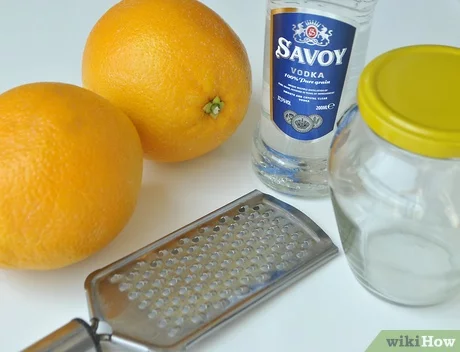
- How to Make Orange Oil Orange oil is a type of essential oil that is often used in food preparation, cocktails, and mocktails. It contains the natural essence of oranges and can add a fresh and citrusy aroma to your dishes. There are several methods to obtain orange oil, but one popular method involves the use of a microwave. To make orange oil, begin by washing and drying the oranges. Then, using a grater or zester, remove the zest from the oranges. The zest is the outer colored part of the peel and contains the highest concentration of essential oils. Set the zest aside for later use. The next step involves placing the orange zest in a microwave-safe container and covering it with a non-polar, preferably microwaveable fluid. This fluid will help in the extraction of the oils from the zest. The ratio of zest to fluid can vary, but a general guideline is about 1:5. Make sure the container is covered to prevent any contamination. Once the container is prepared, it should be placed in the microwave for a specific period of time at a certain temperature. This time and temperature may vary depending on the type of microwave and the desired outcome. However, a common recommendation is to microwave the mixture for around 4-6 minutes at a medium to high power setting. After the specified time has passed, carefully remove the container from the microwave and allow it to cool down. The cooled mixture can then be strained to separate the extracted orange oil from any remaining solids. The oil can be collected and stored in a suitable container for future use. It is important to note that this method of obtaining orange oil is just one of many proposals available. Other methods, such as steam distillation or cold pressing, can also be used to extract the oil. However, the microwave method provides a quick and improved way to obtain orange oil, and many find it to be a convenient option for home use. In conclusion, making orange oil at home using a microwave is a relatively simple process. By following a few easy steps, you can extract the natural essence of oranges and use it in a variety of dishes and drinks. Whether you want to add a burst of citrus flavor to your favorite recipes or improve the aroma of your home, orange oil is a versatile and fragrant ingredient that will enhance your culinary creations. Orange Essential Oil Orange essential oil is a type of essential oil that is derived from the peel of oranges. It is a highly concentrated liquid that contains the natural fragrance and essence of oranges. The process of making orange essential oil involves several steps. First, the oranges are washed and then dried using towels or other absorbent materials. This step is necessary to remove any dirt or impurities from the oranges. Once the oranges are dry, they are then peeled using a grater or a sharp knife. The peel is carefully removed in order to avoid damaging the inner layer of the orange, which houses the essential oil. After the peel is removed, it is then placed in an oven or a microwave to heat it. The heat helps to release the essential oil from the peel. Next, a solvent is utilized to extract the essential oil from the heated peel. The solvent used is typically a non-polar type of liquid, such as water or a type of oil. The solvent is mixed with the peel and then subjected to pressure or other technical means to dissolve the essential oil. This step helps to separate the essential oil from the peel. Once the essential oil has been dissolved in the solvent, it is then collected and placed in a distillation apparatus. The distillation apparatus is a type of still that utilizes heat to vaporize the essential oil. The vapor produced during the distillation process is then condensed into a liquid form and collected. This liquid form of the essential oil is the final product. Orange essential oil can be used in a variety of ways. It can be added to homemade cleaning products to improve their scent and cleaning power. It can also be used as a natural fragrance in beauty and personal care products, such as lotions and soaps. In addition, orange essential oil can be used in cooking and baking to add a citrus flavor to dishes. It can be used in marinades, dressings, and cocktails/mocktails. It pairs well with other citrus flavors, such as lemon or tangerine. Overall, orange essential oil is a versatile and useful product that has a wide range of applications. Its distinctive aroma and properties make it a popular choice among consumers. Whether you are using it for its scent or its flavor, orange essential oil is sure to enhance your culinary and aromatic experiences. Description The preparation of orange oil can be done by several methods. One of the common methods is using oranges or tangerines that have been baked in an oven at a specific temperature for a certain amount of time. Once the fruit is baked, it can be grated to collect the zest, which contains the essential oil. Another method is through a distillation process, where the orange peels are placed in a heat-resistant container and steam is passed through it to extract the oil. The collected oil can then be subjected to further purification and processing to refine its quality. The purified orange oil can be used for various purposes, such as in the production of food and beverages, as well as in the creation of perfumes and aromatherapy products. In addition to oranges, other citrus fruits like tangerines can also be used for orange oil extraction. The method and conditions for extraction may vary depending on the type of fruit being used. There are also alternative methods for orange oil extraction, such as using a microwave or a supercritical extraction process. These methods may require different technical conditions and equipment. Orange oil is known for its strong citrus scent and is often used in the preparation of cocktails, mocktails, and other beverages. It can also be used as a flavoring in baking or to add a citrus twist to dishes and sauces. In conclusion, the extraction of orange oil involves a series of steps and methods aimed at collecting and refining the essential oil from oranges or tangerines. The oil can be used in a variety of ways and has a wide range of applications in the food, beverage, and fragrance industries. It also adds a burst of citrus to baked goods cocktails and mocktails Orange oil is a versatile ingredient that can be used in a variety of applications, including adding a burst of citrus flavor to baked goods, cocktails, and mocktails. This essential oil is derived from the processing of oranges, using a variety of extraction processes such as steam distillation, cold-pressing, or solvent extraction. The extraction process typically involves heating the oranges to a high temperature, usually around 100 degrees Celsius, to vaporize the essential oil. The vapor is then condensed and collected in a separate container, resulting in the production of orange oil. One popular technique used to extract orange oil is the utilization of a supercritical extraction process. This involves the use of a reactor that contains both water and orange peels. The mixture is heated to a specific temperature and pressure, resulting in a supercritical state where the solvent exhibits both liquid and gas-like properties. This process allows for improved extraction efficiency and higher oil yield. To refine the extracted orange oil, it undergoes a purification process to remove any contaminants. This can be done through several methods, including distillation, where the oil is heated to remove impurities, or through microwaving, where the oil is heated in short bursts to eliminate contaminants. Once the orange oil is refined, it can be used to add a burst of citrus to various food and beverage recipes. It is commonly added to baked goods, such as cakes and cookies, to enhance the flavor profile. The oil can also be used to infuse cocktails and mocktails with a citrusy aroma and taste, making them more refreshing and flavorful. Whether you are a professional chef or a home cook, orange oil is a valuable ingredient that can elevate your culinary creations. Its bright and tangy flavor can transform ordinary dishes into something extraordinary, and its versatility makes it a staple in any kitchen. So next time you’re looking to add a burst of citrus to your recipes, consider incorporating orange oil. Your taste buds will thank you! Sources There are several methods to make orange oil, and different sources provide varying degrees of purity and yield. Here are some common sources used for obtaining orange oil: Fresh Oranges: The most common type of source is fresh oranges. When the oranges are squeezed, the essential oil is released along with the juice. Peel: The peel of the oranges contains a high concentration of essential oil. By processing the peel using steam, the oil can be separated and collected. Supercritical Fluid Extraction: This method utilizes a supercritical fluid, such as CO2, as a solvent to dissolve the essential oil from the orange material. It requires special equipment and precise conditions to achieve a high-quality oil. Steam Distillation: This method involves heating the orange material with water to produce steam, which carries the essential oil. The steam is then cooled and condensed to obtain the oil. Cold Pressing: Cold pressing involves mechanically extracting the oil from the orange material without the use of heat or chemicals. It is commonly used for obtaining citrus essential oils. Each method has its own advantages and disadvantages, and the choice of source depends on the desired purity, yield, and technical capabilities. Students of food science and cooking enthusiasts can experiment with different sources and methods to refine their orange oil extraction technique. Additionally, orange oil can be found in some food and baked goods, as well as used in cocktails and other recipes to add a citrusy flavor.
- Orange Essential Oil
- Description
- It also adds a burst of citrus to baked goods cocktails and mocktails
- Sources
How to Make Orange Oil
Orange oil is a type of essential oil that is often used in food preparation, cocktails, and mocktails. It contains the natural essence of oranges and can add a fresh and citrusy aroma to your dishes. There are several methods to obtain orange oil, but one popular method involves the use of a microwave.
To make orange oil, begin by washing and drying the oranges. Then, using a grater or zester, remove the zest from the oranges. The zest is the outer colored part of the peel and contains the highest concentration of essential oils. Set the zest aside for later use.
The next step involves placing the orange zest in a microwave-safe container and covering it with a non-polar, preferably microwaveable fluid. This fluid will help in the extraction of the oils from the zest. The ratio of zest to fluid can vary, but a general guideline is about 1:5. Make sure the container is covered to prevent any contamination.
Once the container is prepared, it should be placed in the microwave for a specific period of time at a certain temperature. This time and temperature may vary depending on the type of microwave and the desired outcome. However, a common recommendation is to microwave the mixture for around 4-6 minutes at a medium to high power setting.
After the specified time has passed, carefully remove the container from the microwave and allow it to cool down. The cooled mixture can then be strained to separate the extracted orange oil from any remaining solids. The oil can be collected and stored in a suitable container for future use.
It is important to note that this method of obtaining orange oil is just one of many proposals available. Other methods, such as steam distillation or cold pressing, can also be used to extract the oil. However, the microwave method provides a quick and improved way to obtain orange oil, and many find it to be a convenient option for home use.
In conclusion, making orange oil at home using a microwave is a relatively simple process. By following a few easy steps, you can extract the natural essence of oranges and use it in a variety of dishes and drinks. Whether you want to add a burst of citrus flavor to your favorite recipes or improve the aroma of your home, orange oil is a versatile and fragrant ingredient that will enhance your culinary creations.
Orange Essential Oil

Orange essential oil is a type of essential oil that is derived from the peel of oranges. It is a highly concentrated liquid that contains the natural fragrance and essence of oranges.
The process of making orange essential oil involves several steps. First, the oranges are washed and then dried using towels or other absorbent materials. This step is necessary to remove any dirt or impurities from the oranges.
Once the oranges are dry, they are then peeled using a grater or a sharp knife. The peel is carefully removed in order to avoid damaging the inner layer of the orange, which houses the essential oil.
After the peel is removed, it is then placed in an oven or a microwave to heat it. The heat helps to release the essential oil from the peel.
Next, a solvent is utilized to extract the essential oil from the heated peel. The solvent used is typically a non-polar type of liquid, such as water or a type of oil.
The solvent is mixed with the peel and then subjected to pressure or other technical means to dissolve the essential oil. This step helps to separate the essential oil from the peel.
Once the essential oil has been dissolved in the solvent, it is then collected and placed in a distillation apparatus. The distillation apparatus is a type of still that utilizes heat to vaporize the essential oil.
The vapor produced during the distillation process is then condensed into a liquid form and collected. This liquid form of the essential oil is the final product.
Orange essential oil can be used in a variety of ways. It can be added to homemade cleaning products to improve their scent and cleaning power. It can also be used as a natural fragrance in beauty and personal care products, such as lotions and soaps.
In addition, orange essential oil can be used in cooking and baking to add a citrus flavor to dishes. It can be used in marinades, dressings, and cocktails/mocktails. It pairs well with other citrus flavors, such as lemon or tangerine.
Overall, orange essential oil is a versatile and useful product that has a wide range of applications. Its distinctive aroma and properties make it a popular choice among consumers. Whether you are using it for its scent or its flavor, orange essential oil is sure to enhance your culinary and aromatic experiences.
Description

The preparation of orange oil can be done by several methods. One of the common methods is using oranges or tangerines that have been baked in an oven at a specific temperature for a certain amount of time. Once the fruit is baked, it can be grated to collect the zest, which contains the essential oil. Another method is through a distillation process, where the orange peels are placed in a heat-resistant container and steam is passed through it to extract the oil.
The collected oil can then be subjected to further purification and processing to refine its quality. The purified orange oil can be used for various purposes, such as in the production of food and beverages, as well as in the creation of perfumes and aromatherapy products.
In addition to oranges, other citrus fruits like tangerines can also be used for orange oil extraction. The method and conditions for extraction may vary depending on the type of fruit being used.
There are also alternative methods for orange oil extraction, such as using a microwave or a supercritical extraction process. These methods may require different technical conditions and equipment.
Orange oil is known for its strong citrus scent and is often used in the preparation of cocktails, mocktails, and other beverages. It can also be used as a flavoring in baking or to add a citrus twist to dishes and sauces.
In conclusion, the extraction of orange oil involves a series of steps and methods aimed at collecting and refining the essential oil from oranges or tangerines. The oil can be used in a variety of ways and has a wide range of applications in the food, beverage, and fragrance industries.
It also adds a burst of citrus to baked goods cocktails and mocktails
Orange oil is a versatile ingredient that can be used in a variety of applications, including adding a burst of citrus flavor to baked goods, cocktails, and mocktails. This essential oil is derived from the processing of oranges, using a variety of extraction processes such as steam distillation, cold-pressing, or solvent extraction.
The extraction process typically involves heating the oranges to a high temperature, usually around 100 degrees Celsius, to vaporize the essential oil. The vapor is then condensed and collected in a separate container, resulting in the production of orange oil.
One popular technique used to extract orange oil is the utilization of a supercritical extraction process. This involves the use of a reactor that contains both water and orange peels. The mixture is heated to a specific temperature and pressure, resulting in a supercritical state where the solvent exhibits both liquid and gas-like properties. This process allows for improved extraction efficiency and higher oil yield.
To refine the extracted orange oil, it undergoes a purification process to remove any contaminants. This can be done through several methods, including distillation, where the oil is heated to remove impurities, or through microwaving, where the oil is heated in short bursts to eliminate contaminants.
Once the orange oil is refined, it can be used to add a burst of citrus to various food and beverage recipes. It is commonly added to baked goods, such as cakes and cookies, to enhance the flavor profile. The oil can also be used to infuse cocktails and mocktails with a citrusy aroma and taste, making them more refreshing and flavorful.
Whether you are a professional chef or a home cook, orange oil is a valuable ingredient that can elevate your culinary creations. Its bright and tangy flavor can transform ordinary dishes into something extraordinary, and its versatility makes it a staple in any kitchen.
So next time you’re looking to add a burst of citrus to your recipes, consider incorporating orange oil. Your taste buds will thank you!
Sources
There are several methods to make orange oil, and different sources provide varying degrees of purity and yield. Here are some common sources used for obtaining orange oil:
- Fresh Oranges: The most common type of source is fresh oranges. When the oranges are squeezed, the essential oil is released along with the juice.
- Peel: The peel of the oranges contains a high concentration of essential oil. By processing the peel using steam, the oil can be separated and collected.
- Supercritical Fluid Extraction: This method utilizes a supercritical fluid, such as CO2, as a solvent to dissolve the essential oil from the orange material. It requires special equipment and precise conditions to achieve a high-quality oil.
- Steam Distillation: This method involves heating the orange material with water to produce steam, which carries the essential oil. The steam is then cooled and condensed to obtain the oil.
- Cold Pressing: Cold pressing involves mechanically extracting the oil from the orange material without the use of heat or chemicals. It is commonly used for obtaining citrus essential oils.
Each method has its own advantages and disadvantages, and the choice of source depends on the desired purity, yield, and technical capabilities. Students of food science and cooking enthusiasts can experiment with different sources and methods to refine their orange oil extraction technique. Additionally, orange oil can be found in some food and baked goods, as well as used in cocktails and other recipes to add a citrusy flavor.









